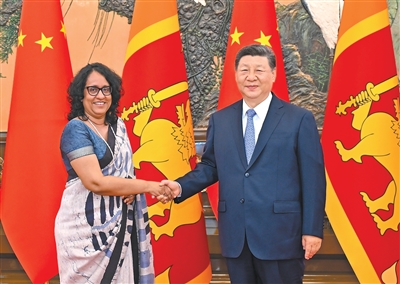|
|
|
On the morning of October 14, President Xi Jinping met with Sri Lankan Prime Minister Amarasuriya, who was in China to attend the Global Women’s Summit, at the Great Hall of the People in Beijing.
|
On the morning of October 14, President Xi Jinping met with Sri Lankan Prime Minister Amarasuriya, who was in China to attend the Global Women’s Summit, at the Great Hall of the People in Beijing.
Xi Jinping pointed out that China and Sri Lanka share a long-standing traditional friendship. The two countries have always developed bilateral relations based on the Five Principles of Peaceful Coexistence, setting an example of friendly coexistence and mutually beneficial cooperation between different nations. China and Sri Lanka are companions in development and revitalization, and good partners for win-win cooperation. China consistently regards Sri Lanka as an important direction in its neighborhood diplomacy and is willing to work with Sri Lanka to carry forward the traditional friendship, expand mutually beneficial cooperation, jointly build a China-Sri Lanka community with a shared future, and better benefit the people of both countries.
Xi Jinping emphasized that China supports Sri Lanka in safeguarding its national sovereignty, independence, and territorial integrity, following a development path suited to its national conditions, focusing on economic development, and achieving national prosperity. China is willing to work with Sri Lanka to high-quality co-build the “Belt and Road,” jointly expand cooperation in port economy, modern agriculture, digital economy, green economy, tourism, and other areas, and support Sri Lanka’s economic and social development. The two sides should strengthen law enforcement and security cooperation, and resolutely combat cross-border gambling and fraud crimes. They should enhance coordination and cooperation within multilateral frameworks such as the United Nations, promote equal and orderly world multipolarization and inclusive and beneficial economic globalization, and firmly safeguard the common interests of the Global South.
Amarasuriya conveyed President Disanayake’s sincere greetings to President Xi Jinping, stating that President Xi’s speech at the Global Women’s Summit was of profound significance, demonstrating China’s important leadership role in promoting the cause of women worldwide. Sri Lanka highly values its relations with China, firmly adheres to the One-China principle, and actively supports and participates in the high-quality co-construction of the “Belt and Road.” He expressed gratitude for China’s valuable support to Sri Lanka’s economic and social development and hopes to learn from China’s modernization experience, further strengthen cooperation with China, and achieve new development. The four global initiatives proposed by President Xi Jinping are of great significance in the current turbulent international situation, and Sri Lanka will work with China to implement them and safeguard the common interests of the Global South.
Wang Yi attended the meeting.
Great Hall of the People
The Great Hall of the People is a state building located on the western edge of Tiananmen Square in Beijing. Completed in 1959, it was built in just ten months as one of the “Ten Great Buildings” constructed for the 10th anniversary of the People’s Republic of China. It serves as the meeting place for the National People’s Congress and hosts significant political and diplomatic events.
Beijing
Beijing is the capital of China, with a history spanning over three millennia as a cultural and political center. It served as the seat of power for several imperial dynasties, most notably the Ming and Qing, which left behind iconic landmarks like the Forbidden City. Today, it is a global metropolis that blends ancient heritage, such as the Great Wall and Temple of Heaven, with modern architecture and infrastructure.
Global Women’s Summit
The Global Women’s Summit is a major international conference dedicated to advancing gender equality and women’s empowerment. While not a single historical site, these summits have a modern history, emerging prominently in the late 20th and early 21st centuries as a platform for leaders, activists, and change-makers to discuss critical issues and forge collaborative solutions. They serve as a dynamic forum for sharing strategies, building networks, and launching initiatives aimed at accelerating progress for women and girls worldwide.
Five Principles of Peaceful Coexistence
The Five Principles of Peaceful Coexistence, known as Panchsheel, are a set of principles to govern relations between states. They were first formally codified in the 1954 Sino-Indian Agreement, championed by the leaders of India, China, and Myanmar. The principles emphasize mutual respect for sovereignty, non-aggression, non-interference, equality, and peaceful co-existence.
Belt and Road
The Belt and Road Initiative (BRI) is a modern global infrastructure development strategy launched by China in 2013. It aims to enhance regional connectivity and create a modern-day “Silk Road” by building a vast network of trade routes, echoing the historical Silk Road that linked Asia and Europe. The initiative involves massive investments in infrastructure projects like ports, railways, and energy pipelines across Asia, Africa, and Europe.
United Nations
The United Nations is an international organization founded in 1945 after World War II to promote peace, security, and cooperation among nations. Its headquarters in New York City serves as a primary meeting place for its member states to address global issues such as conflict resolution, human rights, and sustainable development.
Global South
“Global South” is not a specific geographical place but a term referring to countries in Africa, Asia, Latin America, and Oceania that are often characterized by a history of colonialism and a developing or emerging economy. It emerged in the late 20th century as an alternative to terms like “Third World,” highlighting shared political and economic interests rather than just a geographical location. The concept is used to discuss issues of global inequality, development, and post-colonial relations.
One-China principle
The One-China principle is a political and legal concept asserting there is only one sovereign state of China, with the People’s Republic of China (PRC) as its sole legitimate government. It is a foundational doctrine for the PRC, which views Taiwan as an inalienable part of its territory. This principle is a central tenet in cross-strait relations and a prerequisite for any country seeking diplomatic relations with Beijing.


